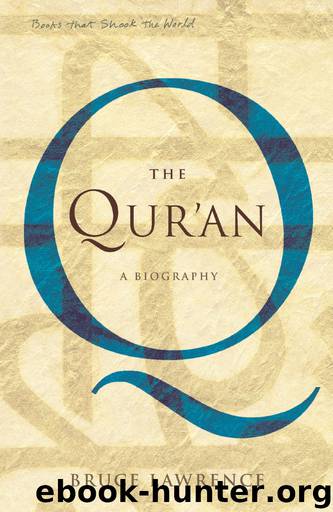Quran by Bruce; Lawrence

Author:Bruce; Lawrence [Lawrence, Bruce;]
Language: eng
Format: azw3, epub
Publisher: Atlantic Books Ltd
Published: 0101-01-01T00:00:00+00:00
Yet not all the Divine Names are beautiful, at least by human standards. Some of the Divine Names are majestic or severe: God as the Punisher, as the Avenger, as the Exacter, as the One who commands death. Ibn ‘Arabi does not flinch from seeing the full spectrum of Divine Names as the treasure given to the servant, with the human acknowledging God and submitting to Him. They are an invitation to return to one’s origins, to know one’s true self.
For Ibn ‘Arabi, remembering the Divine Names is a collective homage to the Lord of all worlds. Ibn ‘Arabi interprets the Qur’anic verse to mean: To God belong the Most Beautiful Names, and even though the essence of God is unknowable and invisible, the observable world – the planets and stars, the earth, and all of nature – can manifest those same Names; it can partake of the Divine Names as physical and tactile, visible and sentient. However, the Unseen only unfolds its mysteries, it only becomes manifest to human beings when individuals, recognizing the Names as the Most Beautiful Names, make those nominal traits their own actual traits. This requires more than book knowledge or good behaviour. It comes through patience, persistent patience on the path. Patience yields experience of the Divine depth, an experience that shatters and transforms those humans, the best of humans, who strive to appropriate God’s Names as their own.
How many names are there? God has innumerable Names, perhaps as many as 300. There are 300 saints, according to Ibn ‘Arabi, and each of them corresponds to one of the 300 Divine traits. Yet even for the saints it is not the Names in themselves that are important, but rather the parallel between the holy person who invokes a Name and the subsequent experience of living that Name without residual attachment to one’s own needs or desires.
Only the deeply sincere, those who have achieved insight and persisted with patience, become known as saints. While saints, like others, make the spiritual journey from mundane, ordinary existence, they journey within God as the Prophet Muhammad did.
To journey within God means, of course, that it is God who incites the seeker as well as guides him to the highest destiny. ‘Thus when God makes the spiritual seeker, or saint, travel through His Most Beautiful Names to the other Names and ultimately to all the Divine Names,’ explains Ibn ‘Arabi, ‘he comes to know the transformation of his states and the states of the whole world. And when he has completed his share of the journey through the Names and has come to know the Signs that the Names of God gave him during that journey, he retraces his steps. On his return, he continues to pass through the different sorts of worlds, taking from each world that aspect of himself which he had left there and reintegrating it in his self, until he arrives back on earth.’
Ibn ‘Arabi was granted his own parallel to the Night Journey and Ascent of the Prophet Muhammad.
Download
This site does not store any files on its server. We only index and link to content provided by other sites. Please contact the content providers to delete copyright contents if any and email us, we'll remove relevant links or contents immediately.
| Hadith | History |
| Law | Mecca |
| Muhammed | Quran |
| Rituals & Practice | Shi'ism |
| Sufism | Sunnism |
| Theology | Women in Islam |
The History of Jihad: From Muhammad to ISIS by Spencer Robert(2629)
Nine Parts of Desire by Geraldine Brooks(2369)
The Turkish Psychedelic Explosion by Daniel Spicer(2358)
The First Muslim The Story of Muhammad by Lesley Hazleton(2273)
The Essential Rumi by Coleman Barks(2048)
1453 by Roger Crowley(2031)
The Last Mughal by William Dalrymple(1858)
Trickster Travels: A Sixteenth-Century Muslim Between Worlds by Davis Natalie Zemon(1848)
Muhammad: His Life Based on the Earliest Sources by Martin Lings(1648)
God by Aslan Reza(1644)
by Christianity & Islam(1636)
A Concise History of Sunnis and Shi'is by John McHugo(1567)
No God But God by Reza Aslan(1545)
Magic and Divination in Early Islam by Emilie Savage-Smith;(1534)
The Flight of the Intellectuals by Berman Paul(1503)
Nothing to Envy by Barbara Demick(1450)
Art of Betrayal by Gordon Corera(1431)
What the Qur'an Meant by Garry Wills(1395)
Getting Jesus Right: How Muslims Get Jesus and Islam Wrong by James A Beverley & Craig A Evans(1342)
